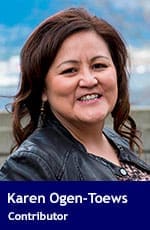 The Business Council of British Columbia sees “a generational opportunity to accelerate and realize a new future where Indigenous communities and businesses are equitably participating in B.C.’s open trading economy.”
The Business Council of British Columbia sees “a generational opportunity to accelerate and realize a new future where Indigenous communities and businesses are equitably participating in B.C.’s open trading economy.”
And Kim Baird, a First Nations leader and advocate, says: “From resource extraction projects on First Nation traditional territories to First Nations developing their reserve or treaty lands, make no mistake: First Nations are open for business.”
Reading Time: 4 minutes
But how much of that business comes from government?
We know that across Canada the federal government has committed to a target of five percent of its procurement spending going to Indigenous businesses, reflecting how Indigenous people make up roughly five percent of Canada’s population.
But that five percent procurement target has yet to be achieved. The Canadian Council for Aboriginal Business (CCAB) notes that in some years the share of federal procurement for Indigenous businesses has been as low as 0.32 percent.
What about B.C.? How many First Nations businesses in B.C. do business with the provincial government? How much of B.C.’s annual $7 billion in spending goes to Indigenous businesses?
Who knows? B.C.’s current budget documents don’t tell us.
The B.C. government does have a procurement strategy that promises an Indigenous-specific procurement plan and capacity-development opportunities for Indigenous businesses. But at this point there’s no concrete plan; just “continued collaboration and engagement” to develop one.
We’re happy to offer B.C. some help, by way of the Yukon government, which in December unveiled a new territorial procurement policy with this statement:
“The Yukon First Nations Procurement Policy will strengthen outcomes for Yukon First Nations people and businesses by providing opportunities for Yukon First Nations governments, businesses and people to participate in territorial procurements. The new policy also encourages Yukon businesses to bid on government contracts in partnership with Yukon First Nations businesses.”
Now the Northwest Territories government is also working on a procurement policy.
The Yukon policy was developed with First Nations governments, and was endorsed by Yukon First Nations Grand Chief Peter Johnston and the Yukon First Nations chiefs. The plan is to implement it in February.
Here are some of the highlights:
Increased hiring
- Points will be allocated to tenders that involve bids committing to hire Yukon First Nations people to work on territorial procurement projects.
- Worker development plans will connect Yukon First Nations people to training, skills development and employment opportunities associated with territorial procurements.
More community engagement
- Community development agreements will provide direct benefits and opportunities to Yukon First Nation people, businesses and communities for projects within a Yukon First Nation’s traditional territory.
- Annual community contract forecasts will be shared with Yukon First Nations communities.
- Yukon will meet with each First Nation government annually to review Yukon’s capital spending plans for capital projects.
Opportunities for businesses
- New procurement tools will increase the number of territorial procurements awarded to Yukon First Nations businesses or bids involving Yukon First Nations businesses.
- A business registry will list Yukon First Nation-owned businesses. The registry will contain information on the goods and services offered by First Nations businesses and will be accessible to Yukon government procurement authorities.
- Bid value reductions will be available to bidders and sub-contractors based on their percentage of Yukon First Nation ownership. This will increase the competitiveness of bids submitted by Yukon businesses and First Nations businesses.
Greater accountability
- A monitor and review committee will be established to ensure policy objectives are being met and improvements to policy effectiveness are being made.
- Contractor performance will be assessed to determine the extent to which contractors meet contract obligations related to the participation measures.
- Yukon government will aim for more First Nations representation in the impartial review authority tasked with hearing complaints related to procurement processes.
There’s no mention yet of a Yukon target such as the CCAB’s five percent of federal procurement purchasing to reflect the Indigenous share of Canada’s population. Yukon’s Indigenous population amounts to almost 24 percent. In the Northwest Territories, it’s just over 50 percent.
B.C.’s Indigenous population is more like six percent. Should we, then, look for six percent of provincial procurement spending?
We might keep that number in mind but first let’s see the B.C. government’s “continued collaboration and engagement” turn into a solid Indigenous procurement plan.
Karen Ogen-Toews is an elected councillor of the Wet’suwet’en Nation in B.C., a former elected Wet’suwet’en chief and CEO of the First Nations LNG Alliance.
Karen is one of our contributors. Why aren’t you?
For interview requests, click here. You must be a Troy Media Marketplace media subscriber to access our Sourcebook.
The views, opinions and positions expressed by columnists and contributors are the author’s alone. They do not inherently or expressly reflect the views, opinions and/or positions of our publication.


